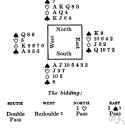BID
abbr.
Bachelor of Industrial Design
bid
(bĭd)v. bade (băd, bād) or bid, bid·den (bĭd′n) or bid, bid·ding, bids
v.tr.
1. past tense and past participle bid
a. To offer or propose (an amount) as a price.
b. To auction (a contract): The city will bid the project next summer.
c. To offer (someone) membership, as in a group or club: "glancing around to be sure that he had been bid by a society that he wanted" (Louis Auchincloss).
d. Games To state one's intention to take (tricks of a certain number or suit in cards): bid four hearts.
2. To utter (a greeting or salutation): I bid you farewell.
3. To issue a command to; direct: "Lee ... bid the captain sit beside him and report" (Stephen W. Sears).
4. To invite to attend; summon: The host bid the guests come to dinner.
v.intr. past tense and past participle bid
1. To make an offer to pay or accept a specified price: decided not to bid on the roll-top desk.
2. To seek to win or attain something; strive.
n.
Phrasal Verbs: 1.
a. An offer to pay a certain amount of money for something: made a bid on the antique desk.
b. The amount offered or proposed: The highest bid at the auction was $5,000.
2. An invitation, especially one offering membership in a group or club.
3. An earnest effort to win or attain something: a team in a bid to win the championship; a candidate who made a bid for the presidency.
4. Games
a. The act of bidding in cards.
b. The number of tricks or points declared.
c. The trump or no-trump declared.
d. The turn of a player to bid.
bid in
To outbid on one's own property at an auction in order to raise the final selling price.
bid out
To offer (work) for bids from outside contractors.
bid up
Idioms: To cause (a price) to rise by increasing the amount bid: bid up the price of wheat.
bid defiance
To refuse to submit; offer resistance to.
bid fair
To appear likely.
[Middle English bidden, to ask, command (from Old English biddan; see gwhedh- in Indo-European roots) and Middle English beden, to offer, proclaim (from Old English bēodan; see bheudh- in Indo-European roots).]
bid′der n.
American Heritage® Dictionary of the English Language, Fifth Edition. Copyright © 2016 by Houghton Mifflin Harcourt Publishing Company. Published by Houghton Mifflin Harcourt Publishing Company. All rights reserved.
bid
(bɪd)vb, bids, bidding, bad, bade, (esp for senses 1, 2, 5, 7)bid, bidden or (esp for senses 1, 2, 5, 7)bid
1. (often foll by: for or against) to offer (an amount) in attempting to buy something, esp in competition with others as at an auction
2. (Commerce) commerce to respond to an offer by a seller by stating (the more favourable terms) on which one is willing to make a purchase
3. (tr) to say (a greeting, blessing, etc): to bid farewell.
4. to order; command: do as you are bid!.
5. (usually foll by: for) to attempt to attain power, etc
6. (tr) to invite; ask kindly: she bade him sit down.
7. (Bridge) bridge to declare in the auction before play how many tricks one expects to make
8. bid defiance to resist boldly
9. bid fair to seem probable
n
10.
a. an offer of a specified amount, as at an auction
b. the price offered
11. (Commerce) commerce
a. a statement by a buyer, in response to an offer by a seller, of the more favourable terms that would be acceptable
b. the price or other terms so stated
12. an attempt, esp an attempt to attain power
13. (Card Games) bridge
a. the number of tricks a player undertakes to make
b. a player's turn to make a bid
14. (Stock Exchange) short for bid price
[Old English biddan; related to German bitten]
ˈbidder n
Collins English Dictionary – Complete and Unabridged, 12th Edition 2014 © HarperCollins Publishers 1991, 1994, 1998, 2000, 2003, 2006, 2007, 2009, 2011, 2014
bid
(bɪd)v. bade bid, bid•den bid, bid•ding, v.t.
1. to command; order; direct: to bid them depart.
2. to say as a greeting, wish, etc.: to bid good night.
3. to offer (a certain sum) as the price one will charge or pay: They bid $25,000 and got the contract.
4. to enter a bid of (a given quantity or suit at cards).
5. to offer or declare: to bid defiance.
6. to invite.
v.i. 7. to command; order; direct: Do as I bid.
8. to make a bid.
9. bid up, to increase the market price of by increasing bids.
n. 10. an act or instance of bidding.
11.
a. an offer to make a specified number of points or to take a specified number of card tricks.
b. the amount of such an offer.
c. the turn of a person to bid.
12. an invitation: a bid to join a club.
13. an attempt to attain some goal or purpose.
14. the highest price a prospective buyer is willing to pay for a security during a trading period.
Idioms: bid fair, to seem likely.
[before 900; Middle English bidden, Old English biddan to beg]
bid′der, n.
b.i.d.
(in prescriptions) twice a day.
[< Latin bis in diē]
Random House Kernerman Webster's College Dictionary, © 2010 K Dictionaries Ltd. Copyright 2005, 1997, 1991 by Random House, Inc. All rights reserved.
bid
- Derives from Old English beodan, "to offer or command."See also related terms for offer.
Farlex Trivia Dictionary. © 2012 Farlex, Inc. All rights reserved.
bid
1. 'bid' in offers of payment
If you bid for something that is being sold, you offer to pay a particular amount of money for it. When bid has this meaning, its past tense and past participle is bid.
He bid a quarter of a million pounds for the portrait.
2. 'bid' in greetings and farewells
People used to use bid with expressions like good day and farewell. This use still occurs sometimes in stories. When bid has this meaning, its past tense is either bid or bade and its past participle is either bid or bidden.
The old woman brought him his coffee and shyly bid him goodbye.
We bade Nandron a goodbye which was not returned.
Tom had bid her a good evening.
We had bidden them good night.
In modern English, you use say instead of 'bid' in sentences like these.
I said good evening to them.
Gertrude had already had her supper and had said good night to Guy.
However, when you use say, the indirect object goes after the direct object. You do not say 'I said them good evening'.
Collins COBUILD English Usage © HarperCollins Publishers 1992, 2004, 2011, 2012
bid
Past participle: bid/bidden
Gerund: bidding
| Imperative |
|---|
| bid |
| bid |
Collins English Verb Tables © HarperCollins Publishers 2011
ThesaurusAntonymsRelated WordsSynonymsLegend:
| Noun | 1. |  bid - an authoritative direction or instruction to do something bid - an authoritative direction or instruction to do somethingspeech act - the use of language to perform some act countermand - a contrary command cancelling or reversing a previous command order - (often plural) a command given by a superior (e.g., a military or law enforcement officer) that must be obeyed; "the British ships dropped anchor and waited for orders from London" commission, direction, charge - a formal statement of a command or injunction to do something; "the judge's charge to the jury" commandment - something that is commanded injunction - a formal command or admonition behest - an authoritative command or request open sesame - a magical command; used by Ali Baba |
| 2. |  bid - an attempt to get something; "they made a futile play for power"; "he made a bid to gain attention" bid - an attempt to get something; "they made a futile play for power"; "he made a bid to gain attention" | |
| 3. |  bid - a formal proposal to buy at a specified price bid - a formal proposal to buy at a specified priceoffering, offer - something offered (as a proposal or bid); "noteworthy new offerings for investors included several index funds" overbid - a bid that is higher than preceding bids buyout bid - a bid to buy all of a person's holdings | |
| 4. |  bid - (bridge) the number of tricks a bridge player is willing to contract to make bid - (bridge) the number of tricks a bridge player is willing to contract to makebridge - any of various card games based on whist for four players statement - a message that is stated or declared; a communication (oral or written) setting forth particulars or facts etc; "according to his statement he was in London on that day" contract, declaration - (contract bridge) the highest bid becomes the contract setting the number of tricks that the bidder must make takeout - (bridge) a bid that asks your partner to bid another suit overcall, overbid - (bridge) a bid that is higher than your opponent's bid (especially when your partner has not bid at all and your bid exceeds the value of your hand) preempt, pre-empt, preemptive bid - a high bid that is intended to prevent the opposing players from bidding | |
| Verb | 1. |  bid - propose a payment; "The Swiss dealer offered $2 million for the painting" bid - propose a payment; "The Swiss dealer offered $2 million for the painting"by-bid - bid on behalf of someone else subscribe - offer to buy, as of stocks and shares; "The broker subscribed 500 shares" overbid - bid more than the object is worth underbid - bid too low outbid - bid higher than others underbid - bid lower than a competing bidder |
| 2. |  bid - invoke upon; "wish you a nice evening"; "bid farewell" bid - invoke upon; "wish you a nice evening"; "bid farewell"felicitate, congratulate - express congratulations | |
| 3. |  bid - ask for or request earnestly; "The prophet bid all people to become good persons" bid - ask for or request earnestly; "The prophet bid all people to become good persons"plead - appeal or request earnestly; "I pleaded with him to stop" | |
| 4. |  bid - make a demand, as for a card or a suit or a show of hands; "He called his trump" bid - make a demand, as for a card or a suit or a show of hands; "He called his trump"play - participate in games or sport; "We played hockey all afternoon"; "play cards"; "Pele played for the Brazilian teams in many important matches" raise - bid (one's partner's suit) at a higher level double - bridge: make a demand for (a card or suit) outcall - make a higher bid than (the previous bid or player); in a card game underbid - bid (a hand of cards) at less than the strength of the hand warrants outbid - bid over an opponent's bid when one's partner has not bid or doubled overbid - to bid for more tricks than one can expect to win, preempt - make a preemptive bid in the game of bridge | |
| 5. |  bid - make a serious effort to attain something; "His campaign bid for the attention of the poor population" bid - make a serious effort to attain something; "His campaign bid for the attention of the poor population"seek - try to get or reach; "seek a position"; "seek an education"; "seek happiness" | |
| 6. |  bid - ask someone in a friendly way to do something bid - ask someone in a friendly way to do somethingrequest - ask (a person) to do something; "She asked him to be here at noon"; "I requested that she type the entire manuscript" challenge - issue a challenge to; "Fischer challenged Spassky to a match" |
Based on WordNet 3.0, Farlex clipart collection. © 2003-2012 Princeton University, Farlex Inc.
bid
noun
1. attempt, try, effort, venture, undertaking, go (informal), shot (informal), stab (informal), crack (informal), endeavour a bid to silence its critics
2. offer, price, attempt, amount, advance, proposal, sum, tender, proposition, submission He made an agreed takeover bid of £351 million.
verb
Collins Thesaurus of the English Language – Complete and Unabridged 2nd Edition. 2002 © HarperCollins Publishers 1995, 2002
bid
verbnoun
2. A spoken or written request for someone to take part or be present:
Informal: invite.
The American Heritage® Roget's Thesaurus. Copyright © 2013, 2014 by Houghton Mifflin Harcourt Publishing Company. Published by Houghton Mifflin Harcourt Publishing Company. All rights reserved.
Translations
أَمَرَتَقْديم أو عَرْض سِعْرمُحاوَلة حُصولمُنَاقَصَةودّع
nabídkanabídnoutpodat nabídkupokus opopřát
bydebyde påforsøgtilbudbede
tarjotatarjoustoivottaakäskeäkutsua
licitiratiponuda
licitálmeghagy
biîja, bjóîa, kveîjabjóîabjóîa ískipa, bjóîatilboî
入札入札する
입찰입찰하다
bandymasduoti paraiškąkainos siūlymaskainos siūlytojasliepti
atvadītiesliktmēģinājumspavēlētpiedāvāt
dať ponukuponúknuťpopriať
bjudabud
การประมูลประมูล
sự đấu thầutrả giá
bid
[bɪd]A. N
1. (at auction) → oferta f, puja f (Fin) → oferta f
the highest bid → la mejor oferta or puja
to raise one's bid → subir su puja
the highest bid → la mejor oferta or puja
to raise one's bid → subir su puja
B. VT
C. VI (bid (pt, pp))
1. (at auction etc) to bid (for) → pujar (por), hacer una oferta (por)
to bid against sb → pujar contra algn
to bid against sb → pujar contra algn
2. (= try) to bid for power/fame → intentar alcanzar el poder/la fama
to bid to do sth → intentar hacer algo
to bid to do sth → intentar hacer algo
4. (liter) to bid fair to + INFIN → prometer + infin, dar esperanzas de + infin
Collins Spanish Dictionary - Complete and Unabridged 8th Edition 2005 © William Collins Sons & Co. Ltd. 1971, 1988 © HarperCollins Publishers 1992, 1993, 1996, 1997, 2000, 2003, 2005
bid
[ˈbɪd] vt
[bid] [ˈbɪd] (pt, pp) [+ sum of money] → faire une enchère de, faire une offre de
[bid or bade] (pt) [bid or bidden] (pp)
to bid sb good day → souhaiter le bonjour à qn
to bid sb farewell → faire ses adieux à qn
to bid sb goodnight → souhaiter la bonne nuit à qn
to bid sb good day → souhaiter le bonjour à qn
to bid sb farewell → faire ses adieux à qn
to bid sb goodnight → souhaiter la bonne nuit à qn
[bid or bade] (pt) [bid or bidden] (pp) (literary) (= command) → ordonner
Collins English/French Electronic Resource. © HarperCollins Publishers 2005
bid
vt
pret, ptp <bid> (at auction) → bieten (→ for auf +acc)
vi
pret, ptp <bid> (at auction) → bieten
pret <bad>, ptp <bidden> to bid fair to … → versprechen zu …; everything bids fair to be successful → es sieht alles recht erfolgversprechend aus
n
(at auction) → Gebot nt (→ for auf +acc); (Comm) → Angebot nt → (for für); any more bids? (at auction) → wer bietet mehr?
(Cards) → Ansage f, → Gebot nt; to raise the bid → höher bieten or reizen, überrufen; to make no bid → passen; no bid! → passe!
(= attempt) → Versuch m; to make a bid for power → nach der Macht greifen; to make a bid for fame/freedom → versuchen, Ruhm/die Freiheit zu erlangen; his bid for fame/freedom failed → sein Versuch, Ruhm/die Freiheit zu erlangen, scheiterte; rescue bid fails → Rettungsversuch erfolglos; the bid for the summit → der Griff nach dem Gipfel; she tried acupuncture in a bid to stop smoking → sie versuchte es mit Akupunktur, um das Rauchen aufzugeben
Collins German Dictionary – Complete and Unabridged 7th Edition 2005. © William Collins Sons & Co. Ltd. 1980 © HarperCollins Publishers 1991, 1997, 1999, 2004, 2005, 2007
bid
[bɪd]1. n → offerta (Comm) (tender) → offerta (di appalto); (attempt) → tentativo (Cards) → dichiarazione f
a suicide bid → un tentativo di suicidio
to make a bid for freedom/power → fare un tentativo per ottenere la libertà/per impadronirsi del potere
a suicide bid → un tentativo di suicidio
to make a bid for freedom/power → fare un tentativo per ottenere la libertà/per impadronirsi del potere
2. vt
b. (bade (pt) (bidden (pp))) (frm) (order) to bid sb do sth → ingiungere a qn di fare qc
3. vi
a. (bid (pt, pp)) (gen) to bid (for) → fare un'offerta (per) (Cards) → dichiarare
to bid against sb → gareggiare contro qn
to bid against sb → gareggiare contro qn
b. (bade (pt) (bidden (pp))) to bid fair to be/do sth → promettere di essere/fare qc
Collins Italian Dictionary 1st Edition © HarperCollins Publishers 1995
bid
(bid) verb1. – past tense, past participle bid – to offer (an amount of money) at an auction. John bid ($1,000) for the painting.
2. (with for) – past tense, past participle bid – to state a price (for a contract). My firm is bidding for the contract for the new road.
3. – past tense bade (bӕd) , past participle ˈbidden – to tell (someone) to (do something). He bade me enter.
4. – past tense bade (bӕd) , past participle ˈbidden – to express a greeting etc (to someone). He bade me farewell.
noun1. an offer of a price. a bid of $20.
2. an attempt (to obtain). a bid for freedom.
ˈbidder nounˈbidding noun
ˈbiddable adjective
obedient. a biddable child.
Kernerman English Multilingual Dictionary © 2006-2013 K Dictionaries Ltd.
bid
→ مُنَاقَصَة, يُزايدُ nabídka, nabídnout bud, byde bieten, Gebot πλειοδοτώ, προσφορά oferta, ofertar, puja, pujar tarjota, tarjous faire une offre, offre licitirati, ponuda fare un’offerta, offerta 入札, 入札する 입찰, 입찰하다 bieden, bod bud, gi bud oferta, zalicytować fazer um lance, oferta ставка, участвовать в торге bjuda, bud การประมูล, ประมูล fiyat vermek, teklif sự đấu thầu, trả giá 投标, 竞价Multilingual Translator © HarperCollins Publishers 2009